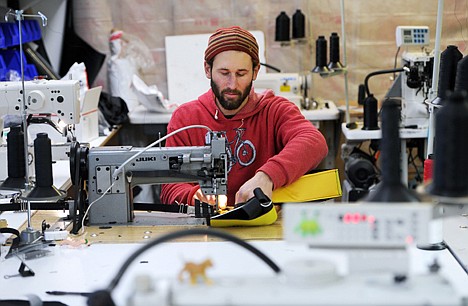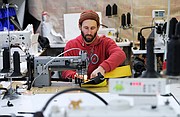'Fat bike' enterprises gain traction in Anchorage
MONICA GOKEY/Anchorage Daily News | Hagadone News Network | UPDATED 11 years, 9 months AGO
ANCHORAGE, Alaska (AP) - You see them on the city's trail network: chunky black rubber tires powered by thunder-cracking thighs. Fat bikes are almost as ubiquitous as cross-country skis on some Anchorage trails.
The city's burgeoning fat bike movement has sprouted a handful of successful businesses in its wake.
Anchorage is a town where bike nuts evolve into entrepreneurs.
Inconspicuously tucked away in a residential neighborhood is Eric Parsons' double-car garage, chock full of machines. Alongside a handful of sewing machines is a bar-tacker, a die press and a fabric cutter (which Parsons notes can cut fingers off).
Parsons' garage is also the headquarters for his business, Revelate Designs. He produces high-quality bike touring accessories - frame bags, handlebar bags and seat bags - all aimed at allowing people to pack enough food and camping gear to stay on their bikes longer.
Revelate is among at least three Anchorage businesses that have cropped up alongside the growing appetite for fat bikes.
Two other local businesses, FATBACK and 9:ZERO:7, manufacture fat bike frames and hardware.
"Fat bikes" get their name from their chubby tires, about two to three inches wider than standard bicycle tires. Fat bike frames are also wider to accommodate the tires. The extra surface area adds traction and float for riding over soft surfaces like snow and sand.
Greg Maytas, owner of FATBACK, said Alaska has long been a hotbed for fat bike development. He points to the 1980s, when people started to jerry-rig bikes for riding on snow.
Maytas got into the fat bike business around the same time Parsons started producing soft goods in 2007.
FATBACK produces all the necessary parts for a fat bike, and the parts sell all over the world. They also sell through Maytas' local bike shop, Speedway Cycles, "Home of the FATBACK."
"When we got started there wasn't much available, and we just saw the need for some different products," Maytas said.
Quality Bicycle Parts product design manager Joe Meiser said the economic effect of the fat bike movement is difficult to gauge because most of the companies are private, meaning they generally don't disclose sales figures. QBP is the bike industry's largest distributor.
"I would venture that (the fat bike) category may be one of the fastest-growing in the industry," Meiser wrote in an email.
"What's fantastic about the culture of the category is that many places that weren't previously cycling meccas or didn't have a great summer riding season now have a winter season," Meiser wrote.
Some growth is also coming from desert and coastal communities, where fat bikes are used to ride on sand and beaches, Meiser said.
Maytas of FATBACK said a lot of fat bike customers are in places with conditions similar to Anchorage.
"Basically any of the cities that have our type of climate where folks nordic ski in the winter, those are places people love to ride fat tire bikes," he said.
Parsons of Revelate Designs is one of those who has taken a fat bike to Alaska's sandier parts. A picture in his garage shows a trip in 2011 when Parsons and friends rode for more than 10 days along the coastline of the Gulf of Alaska from Yakutat to Gustavus.
The movement toward multiday biking adventures is called "bike packing," Parsons said. "If you take rugged bikes and lighter gear you can do a lot more."
The trend has roots in extreme bike events like the Susitna 100, where riders have to carry everything they need for the duration of the race.
Self-support bike trips used to have just a niche following of die-hards, but Parsons said they are growing to include a broader swath of bikers, which is good for Revelate's business.
Revelate was one of the first businesses on the market producing bags for bikes, Parsons said.
Until three years ago, everything Revelate made was produced in Anchorage, mostly by Parsons himself. In the thick of Revelate's growth, Parsons was working 12-hour days to fill orders. It wasn't sustainable.
"I had design knowledge, but I didn't have any production knowledge," Parsons said.
Parsons acquired Revelate's "mountain feedbag" product - a water bottle holder that clips on to the handlebars - as another bike accessories company was going out of business in Oregon. Its proprietor put him in touch with the company's manufacturing contractor.
It was the lifeline Revelate needed. As far as Parsons could tell, there weren't any contract manufacturers that could meet his needs in Anchorage.
Apart from the products sold in Anchorage's bike shops (which Parsons still manufactures in his garage), the majority of Revelate's products are now made in a town outside Eugene, Ore.
The stability of having an established contract manufacturer has allowed Revelate to fill larger orders, Parsons said.
Parsons visits the factory once or twice a year, but he's in touch with it almost daily, he said. "I know most of the sewers on a first-name basis," he said.
While many outdoors products are made in China, Parsons said that isn't in Revelate's future.
"The only reason to do that is to chase the low dollar," he said, highlighting the value in knowing the people who make his products.
Revelate Designs has a single employee in Anchorage who helps Parsons with the day-to-day operations -- but only when the employee isn't off guiding trips on Mount McKinley, Parsons said, laughing.
Eventually Parsons would like to hire three or four people, especially in the area of customer service - a major time-suck for Parsons.
Extra hands would allow Parsons to get back to what he does best: research and develop great bike accessories.
As it stands now, more than one or two people is a tight fit for Revelate's garage headquarters. Parsons also doesn't have room for the added machinery he'd like to invest in, like a seam-taper.
Parsons said he's been on the prowl for a bigger space for a while. As a small business, Revelate falls in the gap between large warehouses and small, yet expensive retail space, Parsons said. The former is more room than he needs, the latter too pricey for his budget.
Parsons admitted he's been an extremely selective shopper when it comes to finding a permanent home for Revelate Designs. He needs affordable space for his factory equipment with a little room to grow.
"I'm picky. I want to be able to bike to work," Parsons said.
Curt Nading, owner of Commercial Real Estate Alaska, said Anchorage has long been a competitive market for affordable commercial space.
"Warehouse space is probably running less than 5 percent vacancy in town," Nading said. "In Alaska, because of the limited amount of land and (high) construction costs, the costs of warehousing is substantially more expensive than in the Lower 48."
In almost 30 years of business, Nading said he's worked with business customers who have struggled to find reasonable space and the right labor pool to set up operations in the area.
Like Parsons, Maytas of FATBACK said his bike parts are produced elsewhere in the U.S., mostly in Portland, but also in Tennessee and Wisconsin. The company also has a carbon fiber frame product made in Taiwan.
"There's not many manufacturers in the U.S. anymore," Maytas said. FATBACK found the manufacturer in Portland by being clued in to the bike industry and learning where other bikes were built.
While Maytas didn't use the word "impossible" to describe what it would be like to move production to Alaska, he said it wasn't practical at this point.
ARTICLES BY MONICA GOKEY/ANCHORAGE DAILY NEWS

'Fat bike' enterprises gain traction in Anchorage
ANCHORAGE, Alaska (AP) - You see them on the city's trail network: chunky black rubber tires powered by thunder-cracking thighs. Fat bikes are almost as ubiquitous as cross-country skis on some Anchorage trails.



